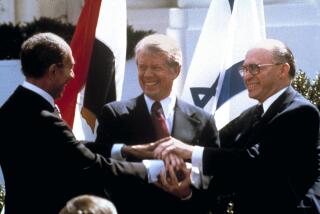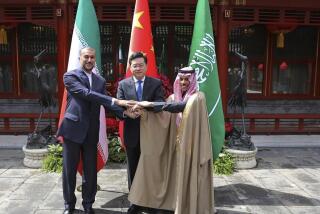Morocco Becomes 2nd Arab Nation to Have Formal Relations With Israel : Diplomacy: Twenty years of contacts culminate in agreement on low-level ties with liaison offices. Expanded trade and tourism are predicted.
- Share via
JERUSALEM — Israel and Morocco established low-level diplomatic relations Thursday, making the North African country the second Arab nation after Egypt to have formal ties with the Jewish state.
After 20 years of contacts that began clandestinely and grew to open visits to Morocco by Israeli ministers, the two countries agreed to establish liaison offices and Israeli officials predicted a rapid broadening of ties, including expanded trade, direct airline service and increased tourism.
“It’s a first step, an opening of the door, and I imagine there will be a continuation,” said Israeli Foreign Minister Shimon Peres, who as prime minister had visited Morocco’s King Hassan II in 1986 and who negotiated the agreement over the past three months. “I assume this will influence other countries, and we are working in that direction.”
Although expected since Prime Minister Yitzhak Rabin stopped in Morocco en route home from signing the peace accord with the Palestine Liberation Organization in Washington a year ago, Thursday’s move constituted another breakthrough in the Middle East peace process.
Peres called it “the opening of a regional relationship,” different from Israel’s efforts to make peace with its immediate Arab neighbors and part of an emerging effort to develop economic ties across the whole of the Middle East.
Under the agreement, Israel will open a liaison office--an embassy in all but name--in Rabat, the Moroccan capital; Morocco will open a similar diplomatic mission in Tel Aviv, where most countries maintain their embassies. Morocco will also establish a liaison office with the new Palestinian Authority in Gaza City.
“I would rather have diplomatic relations immediately, but we must recognize the fact that patience sometimes pays off,” Rabin said.
Peres said the development was made possible by progress in Israel’s negotiations with the PLO and by Morocco’s desire to promote regional economic cooperation.
*
Hassan will host a major economic conference--the first with extensive Israeli and Arab participation--in the palace in Casablanca at the end of October. More than 1,000 political leaders and business executives are expected to participate in the session, organized by the Geneva-based World Economic Forum and the U.S. Council on Foreign Relations.
Hassan told Peres in a June visit that he was not ready for full diplomatic relations, saying they could be achieved only step by step and urging Israel to make more progress in peace negotiations with Syria and Lebanon.
Egypt, which signed a peace treaty with Israel in 1979, remains the only Arab state with full diplomatic relations with the 46-year-old Jewish state. Jordan signed an accord with Israel on July 28, ending the state of war between them and pledging to conclude with a peace treaty.
Israel had hoped Morocco and other moderate Arab and Muslim states, including Tunisia, would quickly establish ties after the historic peace accord with the PLO last September. But such moves became politically difficult because of the slowness in moving toward Palestinian autonomy in the Gaza Strip, the stalemate in negotiations with Syria and the massacre of about 29 Palestinians by a Jewish settler while they prayed at a West Bank mosque six months ago.
Hassan has long urged other Arab leaders to accept Israel’s existence. Rabin, wearing a wig, false mustache and thick glasses, visited Rabat in 1976 during his first term as prime minister. Hassan later arranged secret meetings between Israeli and Egyptian officials, leading to President Anwar Sadat’s 1977 visit to Jerusalem.
In recent years, the relationship between Israel and Morocco had become increasingly open, and Israeli ministers and envoys regularly traveled to Rabat for international conferences and political consultations.
Trade between the two countries was estimated at $100 million in 1993. Israeli companies operate two experimental farms in Morocco, training farmers and selling Israeli agricultural equipment. Telephone links were established this year, and air service is planned.
*
Jews of Moroccan origin in Israel now number about 600,000, about 15% of the Jewish population here, and thousands of them return to Morocco each year on visits, traveling through France and Spain. About 8,000 Jews still live in Morocco, and the current Moroccan Cabinet includes a Jew, Tourism Minister Serge Berdugo.
Israeli commentators also speculated that Hassan, a descendant of the Prophet Mohammed, is interested in negotiations over the future of Jerusalem and agreed to establish the liaison offices to ensure that he had a voice.
More to Read
Sign up for Essential California
The most important California stories and recommendations in your inbox every morning.
You may occasionally receive promotional content from the Los Angeles Times.













